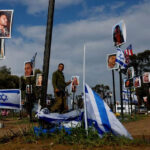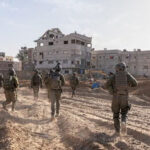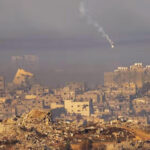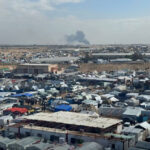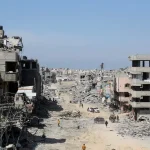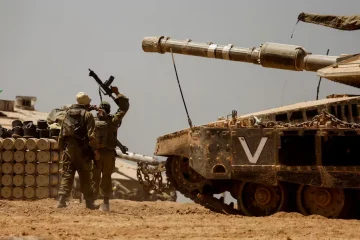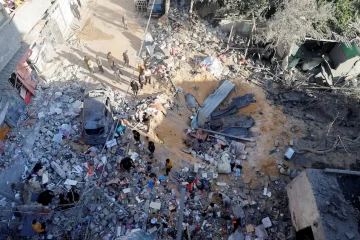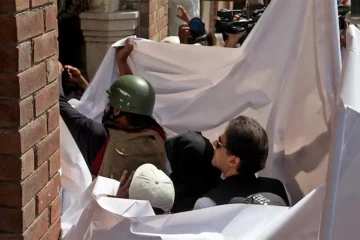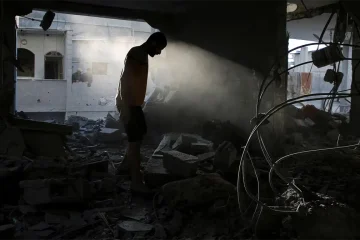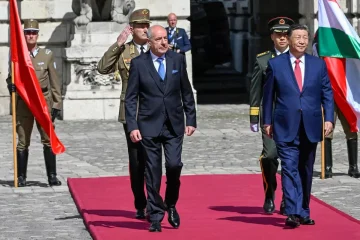ISRAELI tanks battled their way to the heart of Khan Younis in a major new push into the main city of the southern Gaza Strip, as health authorities in Hamas-run Gaza said about 18,000 Palestinians had been killed in the war.
Israeli leaders said dozens of Hamas fighters had surrendered, encouraging more of them to do so, but the Palestinian militant group denied this, calling the claim “false and baseless”.
Residents of Khan Younis said tanks had reached the main north-south road through the city after intense combat through the night that had slowed the Israeli advance from the east. Warplanes were pounding the area west of the assault.
The air rumbled with the constant thud of explosions and thick columns of white smoke rose over the densely crowded city, filled with people displaced from elsewhere in the enclave.
U.N. Secretary-General Antonio Guterres, who has unsuccessfully pushed for a ceasefire in Gaza, said the enclave was in collapse. “I expect public order to completely break down soon and an even worse situation could unfold including epidemic diseases and increased pressure for mass displacement into Egypt,” he said.
Earlier on Sunday, near a city-centre police station, the constant rattle of machinegun fire could be heard. Streets there were deserted as morning broke apart from an old woman and a girl riding on a donkey cart.
“It was one of the most dreadful nights, the resistance was very strong, we could hear gunshots and explosions that didn’t stop for hours,” a father of four displaced from Gaza City and sheltering in Khan Younis told Reuters. He declined to be identified for fear of reprisals.
At the opposite end of the Gaza Strip, in northern areas where Israel had previously said its forces had largely completed their tasks, residents also described some of the most intense fighting of the war so far.
“I daresay it is the strongest battle we have heard in weeks,” said Nasser, 59, a father of seven sheltering in Jabaliya after his house was destroyed in Beit Lahiya, another northern area. Explosions could be heard as he spoke. “We are not going to leave Jabaliya regardless of everything. We shall die here as martyrs or they will leave us alone.”
Israel has vowed to annihilate Hamas, which has ruled Gaza since 2007, after militants burst across the fence on Oct. 7 and went on a rampage through Israeli towns, gunning down families in their homes, killing 1,200 people and seizing 240 hostages.
Gaza’s health authorities say about 18,000 people have been confirmed killed and 49,500 injured in Israeli strikes, with thousands more missing and presumed dead under rubble. The toll no longer includes figures from northern parts of the enclave, beyond the reach of ambulances and where hospitals have ceased functioning.
WHO’S ALIVE?
On Sunday, Prime Minister Benjamin Netanyahu said dozens of Hamas fighters had surrendered, calling it the beginning of the end for the organisation. “Surrender – now,” he told them in a televised statement.
Hamas has denied its fighters have surrendered and said it had destroyed 180 Israeli military vehicles during the fighting, without producing evidence.
It said Israel would not be able to recover the remaining hostages by force, only through negotiations.\
Images emerging on social media on Friday of detained Palestinian men in Gaza kneeling on the ground in their underclothes prompted widespread anger in Arab countries.
Palestinians among a group of 10 released by Israel’s military in Gaza told Reuters they had been physically abused in custody, including by soldiers beating them with shoes on their heads and bodies. A spokesperson for the Israeli military said it was looking into the allegation.
After weeks of fighting concentrated in the north, Israel launched its ground offensive in the south last week with a storm of Khan Younis. With combat now underway along nearly the entire length of the Gaza Strip, international aid organisations say its 2.3 million people have been left with nowhere to hide.
The World Health Organisation said it would be all but impossible to improve the “catastrophic” situation in Gaza, where medical needs had surged and the risk of disease grown while the health system had been greatly reduced.
At the site of one Khan Younis home that had been destroyed by bombing overnight, relatives of the dead were combing the rubble in a daze. They dragged the body of a middle-aged man in a yellow T-shirt from under the masonry.
“We prayed the nighttime prayer and went to sleep, then woke up to find the house on top of us. ‘Who’s alive?!'” said Ahmed Abdel Wahab.
“Three floors above collapsed down and the people are under it,” he said. “My mother and father, my sister and brother, all of my cousins.”
The main hospital in Khan Younis, Nasser Hospital, has been overrun with dead and wounded. On Sunday there was no floor space left in the emergency department as people carried in more wounded wrapped in blankets and carpets. Mohamed Abu Shihab wailed and swore revenge for a son he said had been killed by an Israeli sniper
The vast majority of Gaza’s residents have now been forced from their homes, many fleeing several times with only the belongings they can carry. Israel says it is doing what it can to protect civilians, but even its closest ally the United States says it has fallen short of those promises.
ESCALATION FEARS
Fighting between Israel and the Iran-backed Hezbollah movement in Lebanon, triggered by the Gaza conflict, intensified on Sunday.
At an international conference in Doha, the capital of Qatar which acted as the main mediator for a week-long truce that saw more than 100 hostages freed, Arab foreign ministers criticised the United States for vetoing a U.N. Security Council resolution on Friday that demanded a humanitarian ceasefire in Gaza.
Qatar’s Prime Minister Sheikh Mohammed bin Abdulrahman Al Thani said the war risked radicalising a generation across the Middle East. Jordan’s foreign minister said the Israeli campaign aimed to drive Palestinians from Gaza and met the legal definition of genocide, accusations Israel called outrageous.
U.N. Secretary-General Antonio Guterres said he would “not give up” appealing for a ceasefire.
“I urged the Security Council to press to avert a humanitarian catastrophe and I reiterated my appeal for a humanitarian ceasefire to be declared,” Guterres said. “Regrettably, the Security Council failed to do it, but that does not make it less necessary.”


